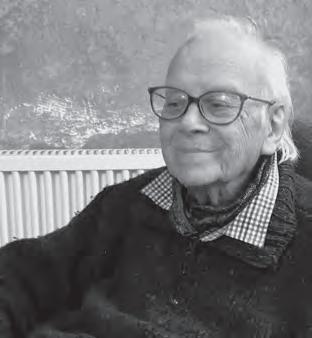
12 minute read
Obituaries
We are saddened to report the deaths of the following OPs. Complete obituaries can be read on Alumnet.
Peter Scupham (1951)
Ian Gordon (1958) writes: Peter Scupham (1933–2022), highly esteemed and much-loved English poet, died peacefully at his home in Norfolk on 11 June 2022. Although Peter’s memories of his time at The Perse immediately after the end of the Second World War were rather negative, he is on record as saying that it was at school that “poetry sang its way into my bones”. The School should be proud of having played a part in the education of so original and distinguished an alumnus.
After National Service, Peter went on to read English at Emmanuel College, Cambridge, where he found the teaching in the English faculty overly dismissive of the importance of enjoyment in reading literature. He particularly disliked the lectures of the acerbic OP literary critic F. R. Leavis (1913), and Leavis’ contempt for less well-known writers. Peter decided, nevertheless, to continue with his studies for an English degree, but by reading literature “in my own way.”
After graduation he went on to teach English as he thought it should be taught, spending most of his teaching career as Head of English at the progressive St Christopher School in Letchworth Garden City, while at the same time pursuing his ambition to become a poet. His poetry, eventually amounting to 12 volumes, powerfully expresses his zest for life, linguistic wit, and consummate technical skill.
Peter was an intellectual free spirit, writing poetry striking for its originality, range of subject matter, and resonating music. With typically modest self-deprecation he described himself in “Amours de Voyage” as a “tame dilettante”, whereas he was indisputably a scrupulous and much-practised craftsman.
Peter’s love of books was not, however, confined to writing them: it also encompassed making and selling them. In 1972 he co-founded the Mandeville Press with poet John Mole, specialising in handprinting contemporary poetry. When he retired from teaching 20 years later, he and his partner, Margaret Steward, purchased a semi-derelict Tudor manor house in South Burlingham, which they lovingly restored and where they annually put on Shakespeare plays in the garden. While doing this they also established the greatlyvalued, antiquarian bookselling business – Mermaid Books.
Peter Scupham’s rich and full life as poet, printer and antiquarian bookseller was one truly and humanely lived through a passion for books. Championship in 1966 whilst he was still the county junior champion. Despite his sporting pursuits, Charles was sufficiently academic to gain entry to Downing College, Cambridge, where he read Engineering in his first two years, specialising in Business Management in his final year. His business education set him up well for his career with Shell, following a short apprenticeship with BAC, working on the first Concorde prototype and winning their apprentice of the year award.
In 1971, he broke our family tradition by marrying young – to Sarah Ireland, a nurse and daughter of a school friend of my father. During their 50-plus years of marriage, Charles and Sarah had a son, Ben, in 1977, then twin sons, Tom and Mark, in 1980. Employment with Shell took them all over the world, finishing up in Calgary, where Charles was Vice-President of Shell Canada, and finally in Wellington, New Zealand, where he led Shell as President of Shell Antipodes. Retirement, which came in 2007, gave Charles the opportunity to serve the game of golf in various ways, from Chairman of the Golf Foundation, the national charity that introduces young people from all backgrounds to golf, to membership of seven committees (chairing two of them) at the Royal & Ancient, golf’s world-governing body based in St Andrews.
Charles Harrison (1967)
Bill Harrison (1968) writes: My brother Charles was just 14 months older than me and began his Perse education in the final year of the Prep in 1959.
He was a natural all-round sportsman but, as early as his school days, golf took priority. As a school boy, he won the Cambridgeshire Men’s County
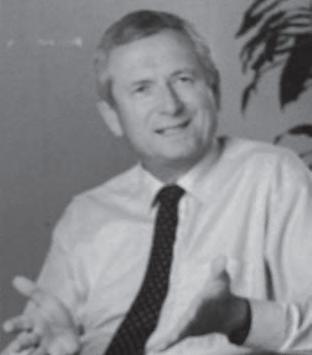
The current chairman of the Golf Foundation wrote in his tribute that Charles, as a natural leader, was very much a guiding light to the charity as chairman for seven years, and was an inspirational figure to the board and all their staff and volunteers. He described him as a highly intelligent, driven, yet warm-hearted man who offered insight, financial acumen and also considerable flair to the role of chairman, helping to secure future funding from core sponsors.
We in his family will certainly miss him. He was always a big hit with my children, as well as his five grandchildren and several descendants from his three siblings.
Charles had lived quite normally with an asymptomatic blood cancer, diagnosed eight years ago, but a massive heart attack on a cruise ship, followed by pneumonia in a Tenerife hospital, finally got the better of him. He was 73 years old and was cremated one day before his father, who had died two years earlier at the age of 104, having donated his remains to Cambridge University Medical Sciences.
A service of thanksgiving for Charles’ life took place near his home town of Woking on Friday 2 September 2022.
Nick Andrew (1966)
Tim Andrew (1969) writes: Nick Andrew joined the Prep in 1956. He was notable for his sharp intellect, great energy and lively, sometimes irreverent, wit. At the Upper, he continued to excel academically, seemingly without undue effort. He achieved A1, A1, A grades at A and S Levels in English, German and French, and it was little surprise when he won a scholarship to read English at St Catharine’s College, Cambridge.
Together with his academic achievements, Nick was a capable sportsman, an accomplished flautist and guitarist, and a talented actor. His introduction to acting at The Perse led to appearances on stage outside school, notably in a professional production of Arthur Miller’s All My Sons.
After graduation, Nick spent two years at the University of York, undertaking research into 17th Century drama, which led to a commission to edit John Dryden’s All for Love. He then moved to an administrative post at the Open University (OU) where he spent 17 years and rose to be Deputy Planning Officer. In addition to his full-time administrative work, he was a part-time OU tutor for courses in drama and the 17th Century.
In 1989, Nick was appointed Registrar of South Bank Polytechnic (now London South Bank University). He stayed there for five years before moving to the University of Bradford as Registrar and Secretary, with overall responsibility for all administrative departments, legal affairs and a £25 million budget. Later, he was Deputy Principal at Bradford.
Nick remained at Bradford until he retired in 2007. He was typically energetic in retirement, pursuing longstanding enthusiasms for cycling, swimming, travel, and taking on numerous voluntary roles.
Nick faced his eventually fatal illness with fortitude and maintained a busy life to the end. He is survived by his widow Margaret, three children and four grandchildren. Roger FitzGerald (1977)
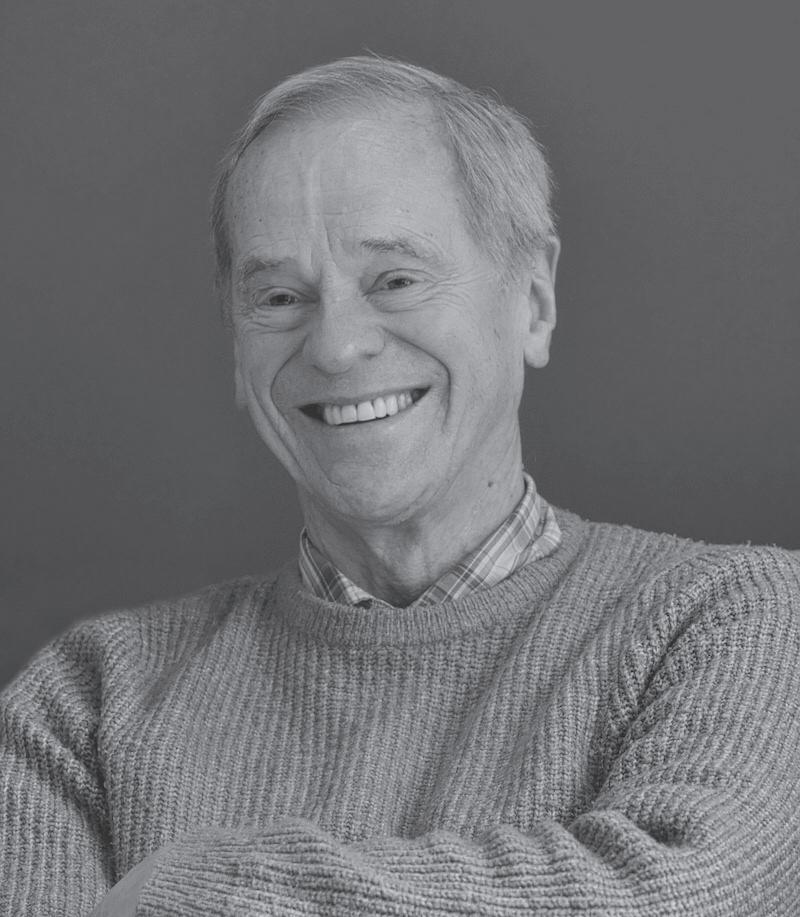
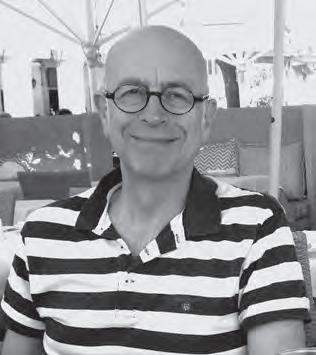
James FitzGerald writes: Roger was born in February 1959 and was brought up on Almoners’ Avenue in Cambridge. From 1966 to 1977, he attended The Perse. He would later speak highly of his time at the School, noting his enjoyment of geography and art lessons in particular. Indeed, it is believed that, had he not gone on to become an architect, Roger would have chosen a career as a geography teacher.
In his time at The Perse, Roger was a keen artist, whose work drew high praise from his tutors. He was also an avid sportsman, playing rugby, hockey and football. He represented the School on the 1st XI cricket team, played as part of the 2nd XV rugby team, and was a member of the Perse Players.
Roger attended the Manchester School of Architecture after leaving The Perse, and completed his studies by writing a dissertation on the architecture of the famous courtyards of the Cambridge Colleges.
He then went on to work for ADP, an influential UK architecture firm responsible for many notable buildings. Those that Roger worked on whilst at ADP include the conversion of Oxford Castle from prison to hotel; the new visitor reception building at the Palace of Westminster; the innovative rebuilding of Riverhead Infants’ School, and notably
for residents of Cambridge, the King Street development of Christ’s College. This final project earned a prize for best new building in the city. From 2001, Roger served as chairman of ADP for 20 years before retiring in 2021, having spent nearly 40 years in total working for the firm and becoming its longest-serving employee.
In his spare time, Roger was a prolific painter. His paintings were given as gifts to family and friends, and many were auctioned for charities such as Cancer Research UK. Many of his architectural drawings and models received public exhibition in galleries including the Royal Academy, Somerset House, The Shard, RIBA, and more. Roger was also a published author, writing four books: Buildings of Britain (1995), Buildings of London (2016), Buildings of New York (2017), and Buildings of Kent (2022).
Roger and his family moved to Sevenoaks Kent, in 1994 and resided happily in a house he designed himself. He married Lynne and had two sons, myself and Will. Diagnosed with pancreatic cancer in 2021, Roger passed away on 6 July 2022. He was known by all to be a charming, inspiring and kindhearted man. He was quietly confident, calm, decisive and funny. Through his architecture he touched many lives, and he will be fondly remembered.
Mary Bedford
Julia Halbert writes: Mary was involved in many areas of school life. The form teacher of 3A, she cared for about 20 eight to nine-year-old boys in each of her 30 years of teaching. Her knowledge and understanding of every one of those boys was deep. She knew their strengths and what they found hard. She remembered all the things that had been going on in their lives and she really cared for them. Whenever I meet an Old Persean who was at the Prep during Mary’s time here, they always comment on how much they enjoyed being taught by her.
Music was a very important part of Mary’s life at the Prep. She ran a choir for many years and I have very fond memories of helping her put on productions such as Joseph and the Amazing Technicolour Dreamcoat. She prepared carols with the choir at Christmas. For many years, she took a group of boys to the Robert Meyer Concerts for Children in London.
As a colleague, she was so supportive. When staff faced difficulties, whether professionally or in their private lives, she was always there to help us work out ways to overcome them. When I was nervously about to head off to Addenbrooke’s for an operation, she quietly handed me a pack of ‘Fresh Wipes’, whispering “I’ll be thinking of you, dear.” 36 years later, I still remember that simple act of kindness.
Mary was also the keeper of many tales of life at the Prep in “the old days.” I loved hearing these stories, such as how in the early days at the Trumpington Road site, staff had to help the farmer move cows out of the field in front of Leighton House so the boys could play football. She moved with the times, however. We were delighted to welcome her back to school for events such as school productions, art exhibitions, and concerts, or for occasional staff reunions. She always commented on how wonderful the play, the artwork, the music, or the site were, with her lovely little smile and that twinkle in her eye.
Mary – we’ll miss you. Thank you for all you did for The Perse and for us.
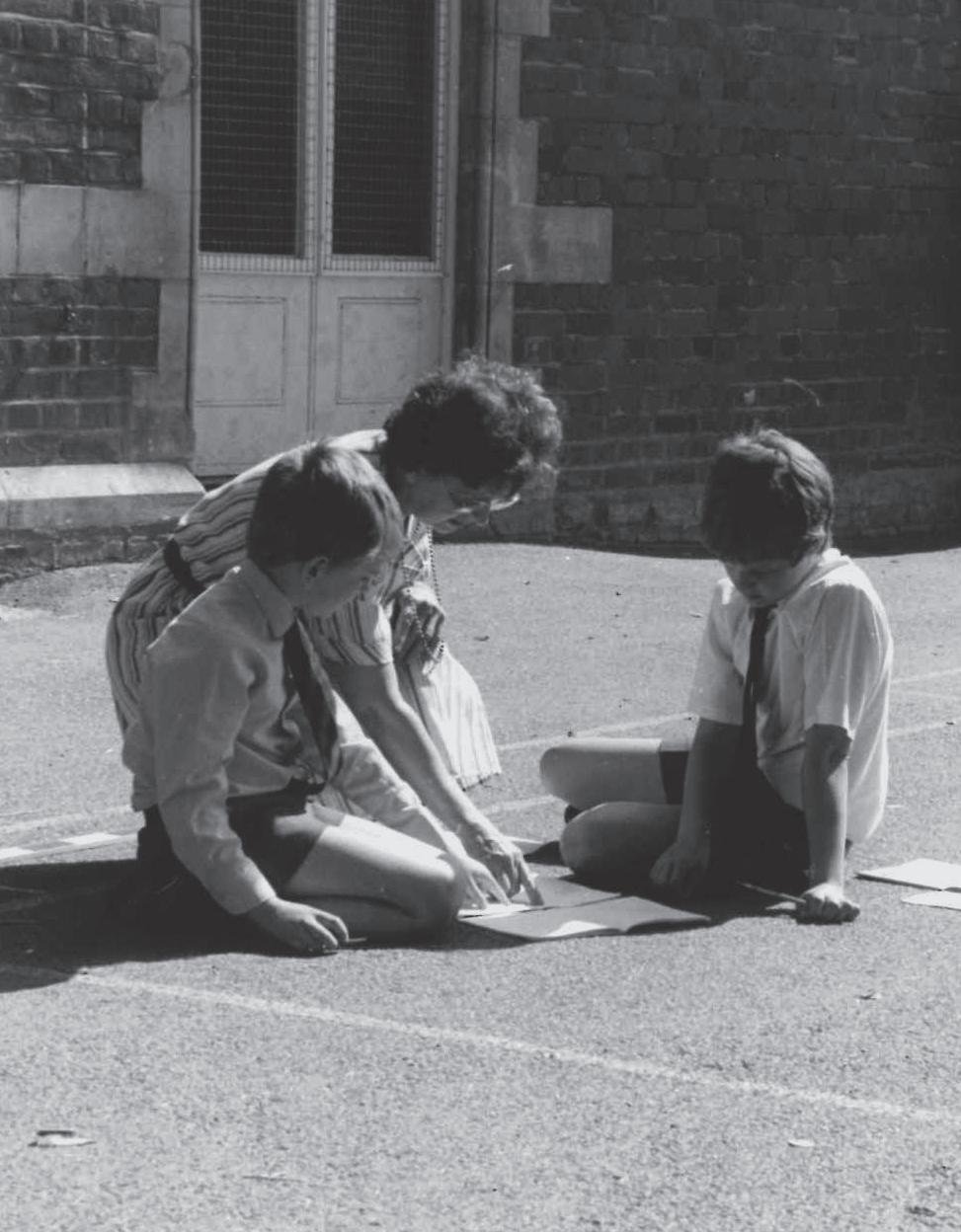
David Owen (1950)
Penny Brassell writes: David William Owen was born in Hove in 1931. He went to school in Harpenden, briefly being evacuated to Swansea during the war, before transferring to Manchester Grammar School. In 1946, his father’s promotion to the post of Assistant Planning Officer for Huntingdonshire meant another move, and as the local grammar school in Huntingdon did not teach Classics, his parents (with the support of the County Education Officer) gained him a place at The Perse School in Cambridge.
To quote from David’s memoirs: “Cambridge was a revelation and I fell for it completely: the old colleges, the Backs, King’s College Chapel…. I especially loved to browse in the bookshops.” At The Perse, he credits the English master Douglas Brown
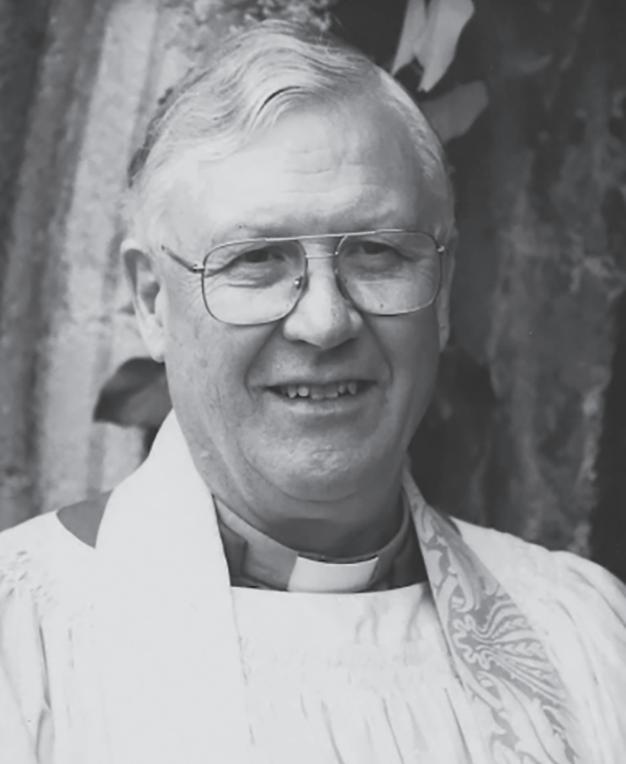
for instilling in him a love of classical music; he also joined the Perse Players, and played Horatio alongside Sir Peter Hall’s Hamlet in 1949 during his final year.
Following two years of National Service, mainly served in Austria as part of the Royal Warwickshire Regiment, he read Classics at Downing College Cambridge, graduating in 1955. He then studied for two years as a theological student in Lincoln, where he met his wife of over 60 years, Liz Allport. He was ordained deacon in Manchester Cathedral in December 1957, and priested the following year.
Initially serving at St Philip’s Salford as a curate, he married Liz in August 1959, and daughter Mary was born there in 1960. In 1961, he moved to Lincolnshire to become Priest-in-Charge of Harrowby in Grantham, where daughters Kate, Penny and Roz were born. In 1965, he moved to become Vicar of Messingham, where their fifth and youngest daughter, Clare, was born.
David became Vicar of the Spilsby group of parishes in 1970. Then, in 1977, he moved to St James’s Louth, where he would spend 15 years as Rector. In 1992, David became Rector of a team ministry looking after seven parishes in Grendon Underwood in Buckinghamshire, at which time he also joined the Franciscans as a Tertiary. He retired at 66, moving to Stephen Road in Headington.
David leaves behind his wife Liz, his five daughters, nine grandchildren and five greatgrandchildren, nearly all of whom were able to be with him for his 90th birthday celebrations in November 2021.
We remember
Brian S Adams (1950) Died 2022, aged 89 years
Oscar Cubitt (2018) Died 18 May 2022, aged 21 years
John T Davies (1962) Died 1 February 2021, aged 76 years
John N Farrow (1959) Died 6 February 2022, aged 81 years
Cecil A Greenhill (1954) Died 14 May 2022, aged 86 years
Adrian D Stark (1948) Died 28 January 2022, aged 90 years
Recent events
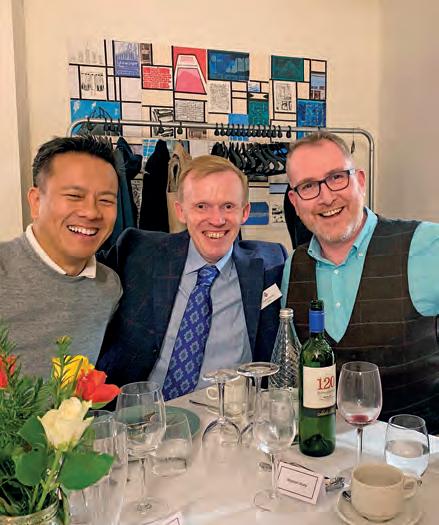
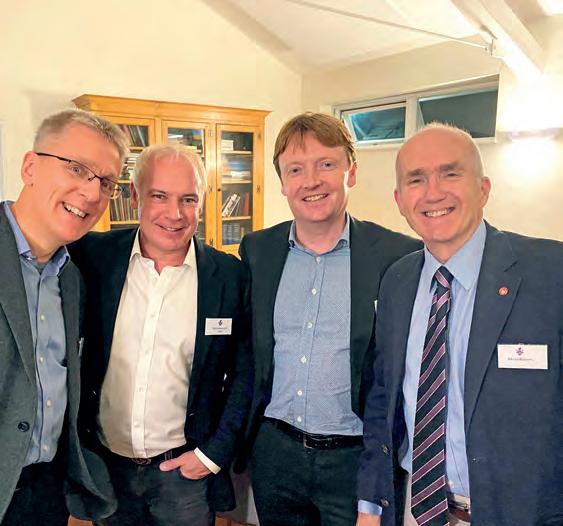
CLASS OF 1990S REUNION DINNER The Class of 1990s reunion dinner was held at The Perse Upper School in October. OPs who left the School in the 1990s gathered together for a drinks reception in the Peter Hall Performing Arts Centre before enjoying a delicious meal in the Barry Room. They were joined by their former peers and old members of staff from their time at the School.







